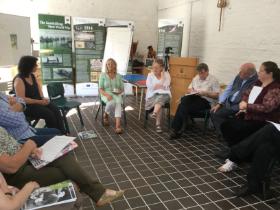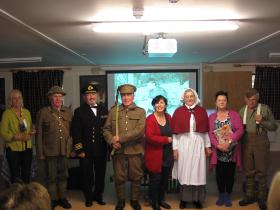Critical Commemoration and Creative Practice
The research theme invites you to join us in thinking about the contemporary relevance of the First World War period.
Together we would like to explore the reasons why we remember, what we choose to remember, and the use we put those memories to. 
Commemoration plays an active role in today’s society and has potential to lead to change in how we think about the past as well as impacting on contemporary connections and relationships.
With the past very much present on our landscape, evident in murals, contemporary rituals and museum collections, we would like to invite community groups to join us in active reflection of the complexity of remembering the First World War period in Ireland and beyond.
We would be delighted to work with community groups interested in approaching the war era from new perspectives. You are welcome to suggest ideas to us, for now some of the themes we are exploring include:
- Unheard stories and experiences of the war period The enduring legacy of the war period, both in its immediate aftermath and what it means a century later;
- The war and post-war experiences of women and children;
- How we might think about the aftermath of the war and the partition of Ireland;
- The relevance of the war period for new communities living in Ireland;
- How the community memories and legacies of the war on the local level differ from the ‘grand narratives’ and traditional national perspectives; and,
- How commemorations by local, diverse, and underrepresented communities are integrated into the broader context of civic commemoration (or how and why they are not).

We are keen to engage in innovative ways, such as through drama, creative writing, creative arts, digital media, as well as promoting new thinking through community talks, and discussions.
We would be delighted if you could join our research group. We have a range of expertise and can work with community groups in a number of areas.
Our investigators include:
Prof Elizabeth Crooke a specialist in museum & heritage studies and leader of the Engaging the Pastresearch group at Ulster University. You can work with Elizabeth if you are planning an exhibition or you have an object or collection you would like to interpret in new ways. Already Elizabeth and Johanne Devlin Trew have worked with a creative writers group, interpreting First World War collections. They are keen to develop this approach further. You can contact Elizabeth via email: em.crooke@ulster.ac.uk.
Dr Johanne Devlin Trew works in the area of oral history and memory studies, migration studies, and health and wellbeing, and is keen to work with community groups who are interested in local history and community arts, drama and performance projects. email: jd.trew@ulster.ac.uk
Dr Kurt Taroff is a specialist in drama and has helped to lead projects with local community groups in Northern Ireland in which they research their personal and community histories and create creative projects out of the results. He is also Principal Investigator on the associated ‘Performing Commemorations’ AHRC-funded project.
KEY
Top right: The Inniskillings in the First World War Group
Bottom Left: Omagh, Robins Drama Group
